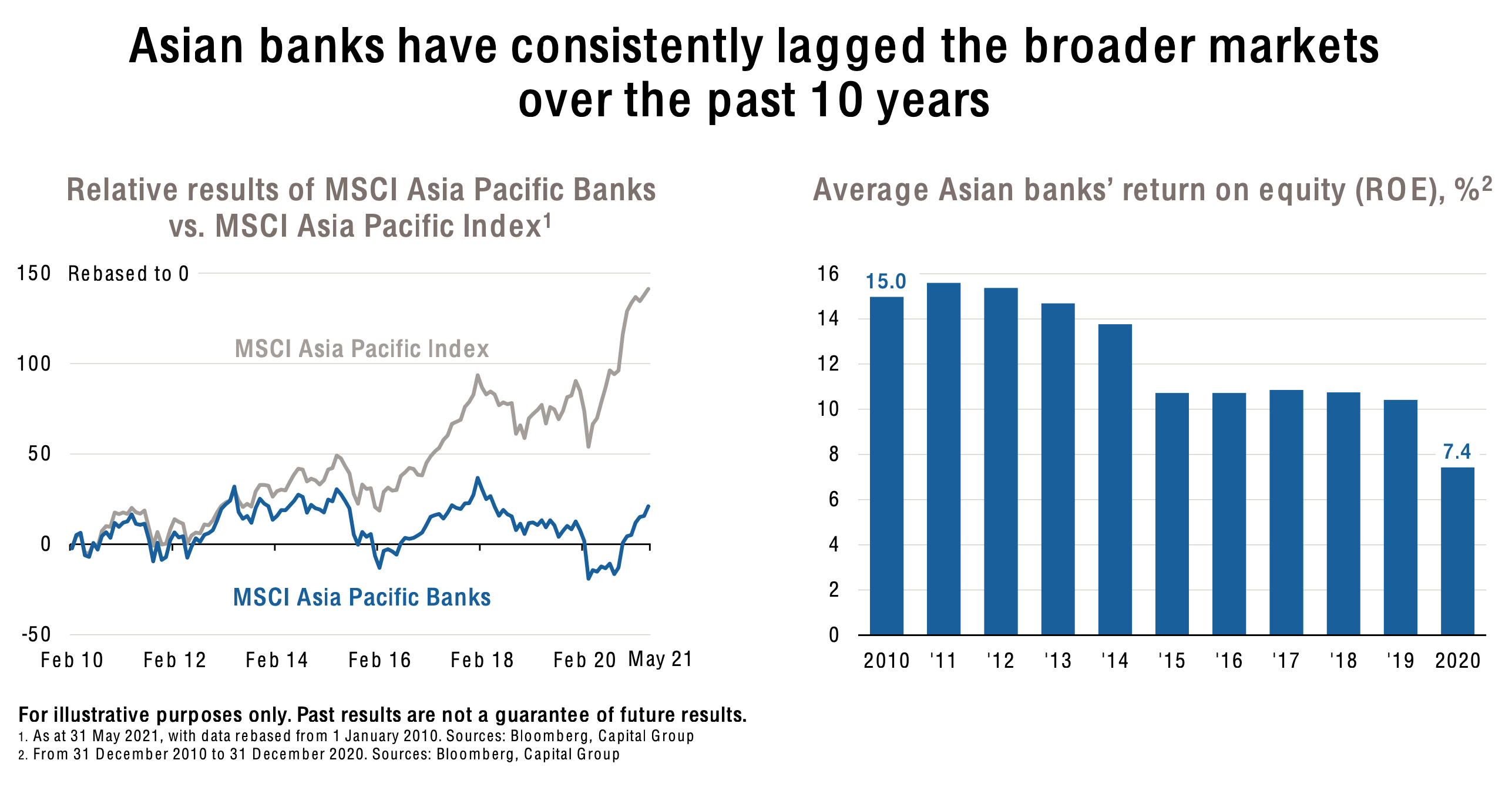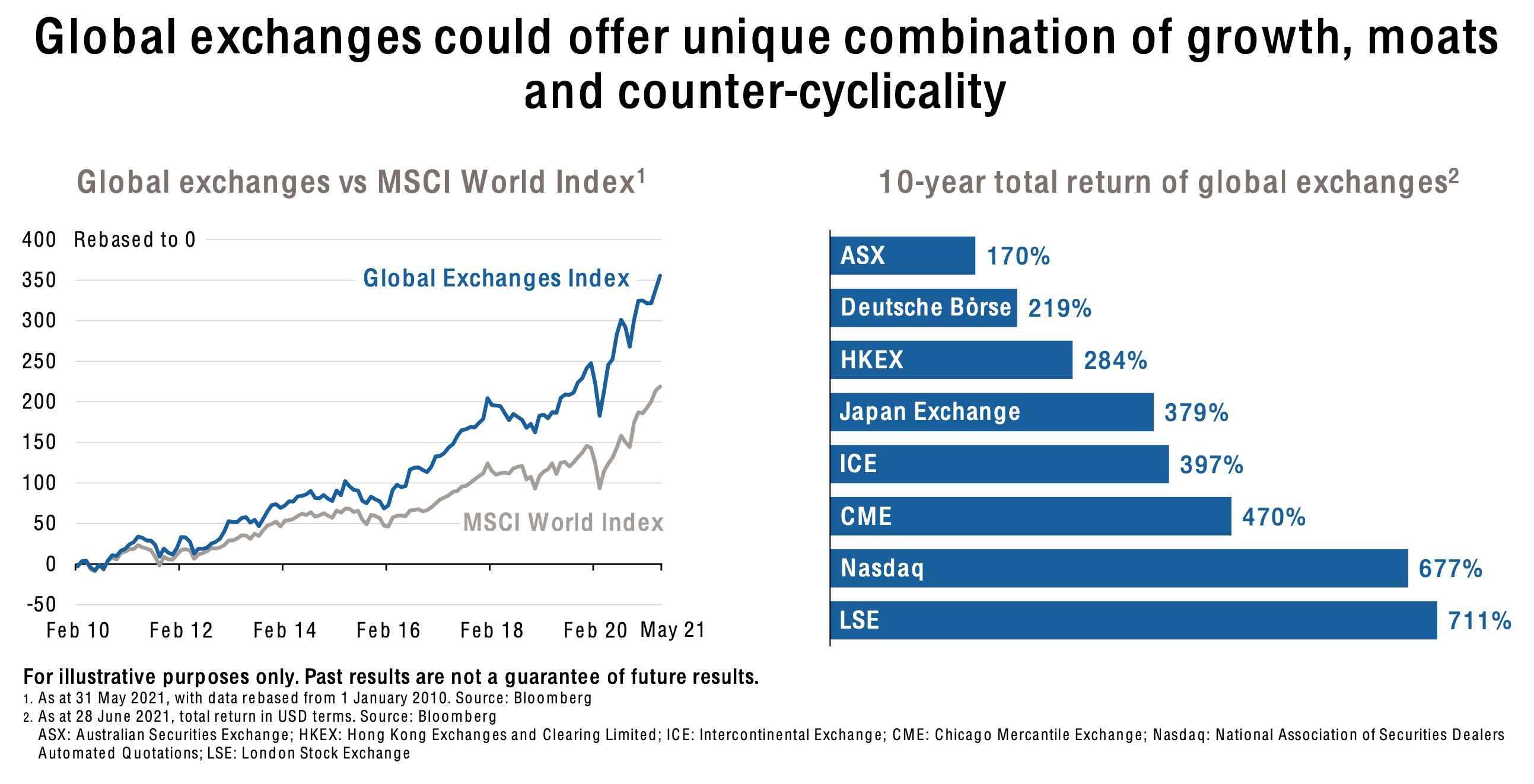One risk that banks can’t afford to ignore
Australian banks remain a staple of local investors, particularly those with a focus on income, and there are many good reasons for this. For one thing, there’s our highly favourable dividend imputation (franking credit) regime. Our Big Four banks also punch above their weight in terms of their return on equity (ROE), which compares extremely favourably on a global basis. Their average ROE sits above 10% as of 31 March versus an average of 8.25% for the US’s four largest banks as of 31 December.
But other parts of the financial sector – both at home and abroad – deserve more investor attention, as Capital Group's Andy Budden and William Pang explained recently during a webinar on the future of the financial sector.
“There are some very powerful secular trends and also a lot of disruption going on, but that makes it a stock pickers’ market,” says Budden, investment director in Capital Group’s Singapore office.
Despite the favourable ROEs of Australia’s banks – led by National Australian Bank (ASX: NAB) on 11.1% and Commonwealth Bank (ASX: CBA) on 10.5% - this figure has been declining for years. Having averaged around 17.5% before the GFC, Australian banks' average ROE dipped to about 15% by the end of 2017 before hitting the current level. This has happened partly in response to a regulatory requirement for higher capital buffers which has affected banks around the world.
Globally, banks have seen their ROEs hit by the BASEL capital requirements imposed post-GFC. Pang, a Singapore-based equity analyst for Capital Group, notes Chinese banks' average ROEs have declined from 15% in 2011 to around 7% in 2020.

Source: Capital Group
Alongside higher capital requirements, he points to “Japanification” – the prolonged period of low interest rates that suppresses banks’ lending businesses; and disruption by financial technology (fintech) companies.
On this last point, Budden and Pang touched on the trend toward “decentralised finance” (DeFi) – most glaringly in the rise and fall (and rise…and fall) of Bitcoin and its underpinning blockchain technology.
They also referenced local ASX darling Afterpay (ASXP APT) and its closest competitor, Zip Co (ASX: Z1P), among the leaders in the fast-growing buy-now-pay-later fintech category. Zip recently made local headlines amid a rumoured approach by Swedish BNPL company Klarna, which is partly owned by Commonwealth Bank.
“DeFi is something many analysts are starting to take more seriously and I believe its rise could pose a serious risk to some of the financial institutions in which we currently invest,” Pang says.
He refers here to the ongoing trials that around 50 monetary authorities around the world are conducting into digital currency, rather than the open-source varieties that have garnered the most press attention.
Budden says it could be a “gamechanger for financial inclusion” in negating the need to pay for physical issuance of currency and for things like tax collection – which have traditionally been key parts of commercial banking.
“The risk is that deposits migrate from commercial banks toward central banks – and why wouldn’t you when they’ve got zero default risk? – but once the deposits go from the commercial banks and undermine their ability to lend, it could take the lending function to central banks, which is rather intriguing,” he says.
Where are fintech disruptors coming from?
Financial exchanges – which were traditionally focused on generating revenue from company listings and clearing house activities – are one area that has seen “some very powerful forces sweeping through,” says Pang. From an Asian perspective, they have benefited from growing demand in China for derivatives-based financial products and for financial data.
“Fast-forward to today and we’ve got the exchanges sitting at the centre of some very powerful secular trends,” says Budden. Though these companies have traditionally been more cyclical in nature, they’ve started to take on more “growthy” characteristics.
“In a couple of cases they’re actually countercyclical, with Hong Kong Exchange a good example,” he says. “It’s like the financial markets’ doorway between China and the rest of the world.”
Budden points to the London Securities Exchange as another example that goes to the heart of the transformation that’s taking place in financial markets trading.
“If you go back 20 years, Goldman Sachs’ New York office had around 600 equity traders. Today they’ve got two, backed up by around 200 programmers,” he says.
“LSE has been a source of market data for a while, but a couple of years ago they bought Refinitiv – second-only to Bloomberg in market data. Market execution is still very important, comprising about one-third of their business but market data is now about 70% of their business, and it’s growing and recurring so is countercyclical.”
He also singles out Chicago Mercantile Exchange as a listed company that is benefiting from growing investor demand for derivative-based financial products.
In a similar vein, Budden highlights credit rating agencies Standard & Poor's and Moody's, which hold up to 85% market share in their US home market. As firms developing credit products require ratings from multiple entities before distributing to various wholesale and retail market segments, these firms have “a really solid foundation for an investment thesis,” says Budden.

Source: Capital Group
Insurance companies – In faster-growing economies within emerging regions, rising levels of wealth have boosted demand for financial services such as advice and products including life insurance. In various markets, these services have become more problematic for banks to provide, too – as we’ve seen in Australia, with banks increasingly hiving off their wealth divisions and insurance businesses in the wake of various inquiries and regulatory crackdowns.
“Regulation is becoming inexorably tighter and we’re seeing lots of digital disruption, so it seems that over the next 10 years banks are going to have to think carefully about whether to innovate or potentially die long, slow deaths,” says Budden.
He argues life insurance is where you’ll find the best opportunities among listed insurers, rather than general insurance such as property, automotive and disaster insurance. “They’re very cyclical businesses and, historically, an interesting time to invest has been when the combined ratio – so premiums over claims – gets really compressed, which is when insurance companies have little choice but to start raising premiums.”
“As we look around the world, we don’t see a lot of that happening right now, and there aren’t a lot of general insurers in our portfolio right now. But it’s different with the life insurers and it is a secular trend, it’s the faster-growing economies where we see more wealthy individuals,” Budden says.
He notes several multinational companies distribute life insurance in some of these markets, though stops short of naming specific examples.
Summing up
Budden says there are several stock-specific opportunities in the wealth management operations of some European banks, particularly in Spain, and in franchises based in Spanish-speaking Latin America.
He and Pang point to some internet platform companies that are copying the strategy of Jack Ma’s ill-fated Alibaba spinoff Alipay. Specific examples here include Korea’s KakaoPay and KakaoBank and Japan’s Softbank, which owns the market’s biggest digital wallet platform, PayPay.
“We’re certainly not suggesting you blindly buy the sector but very specific stock picking could be attractive,” says Budden.
Put today’s investment insights into a long-term perspective
Capital Group believes in a smarter way of investing that combines individuality and teamwork into a tailored approach to help investors meet their goals. For more information, click 'CONTACT' below.
5 topics
6 stocks mentioned
1 contributor mentioned

